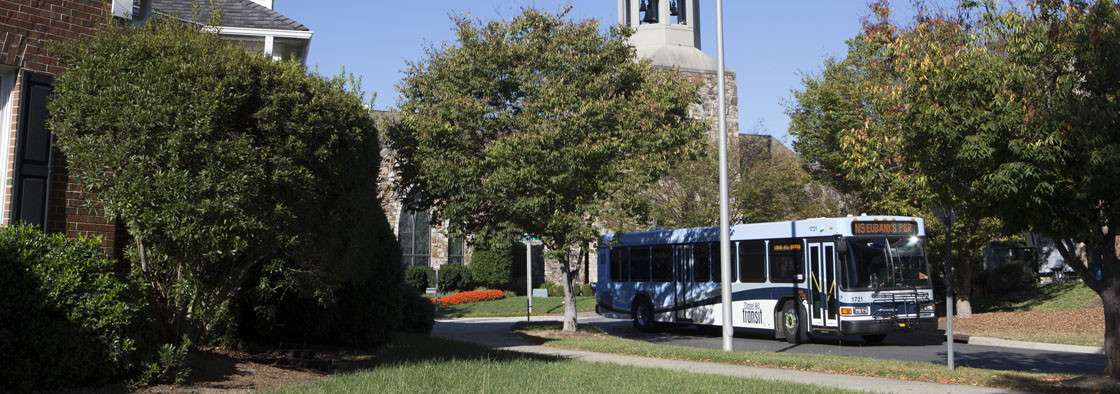FAQs

Bus Rapid Transit (BRT) is an enhanced, high-capacity bus system that offers riders faster, more frequent service than traditional bus service. BRT combines the speed of a rail transit system with the comparatively lower cost of a traditional bus system.
- BRT Only Lanes separate buses from other vehicles, resulting in faster, more efficient transportation.
- Traffic Signal Priority systems hold green lights longer for approaching BRT vehicles.
- High capacity, specialized vehicles feature onboard Wi-Fi and comfortable seating.
- Enhanced transit stations feature covered seating, improved pedestrian crossings, bicycle access, and real-time schedule information.
- Reduced greenhouse gases and other pollutants for cleaner air quality.
The NSBRT project will bring high-capacity transit to the Town of Chapel Hill along an established, high-ridership route, connecting employees, students, and residents to key community assets and hubs such as the University of North Carolina at Chapel Hill’s flagship campus and healthcare facilities.
Running 8.2 miles with 17 stations along Martin Luther King Junior Boulevard, South Columbia Street, and US 15-501 South, the proposed route connects the Eubanks Road Park-and-Ride at the corridor’s northern end to the Southern Village mixed-use community. The NSBRT will feature dedicated bus lanes, transit signal priority systems, optimized station locations, and a companion multiuse path for more reliable, efficient, and multimodal transportation. The service will operate seven days a week, with expanded hours and frequency while UNC Chapel Hill is in session.
The proposed project will improve overall accessibility and mobility in Chapel Hill by accommodating travel demand growth along the corridor, supporting emerging modes of transportation, and leveraging the existing transportation infrastructure to improve connectivity within the corridor.
The NSBRT project will upgrade the current transit infrastructure in the corridor to meet community further and customer needs by adding curb-running dedicated lanes, high-capacity buses, near-level boarding at stations, weekend service and bike/pedestrian improvements. The project is critical to our partners’ sustainability goals and supports affordable housing and other future development within the corridor. NSBRT project will increase transit capacity in the corridor, connect with the regional transit network, and provide the opportunity to expand BRT to other corridors.
NSBRT is an investment in Chapel Hill’s future to address rapidly growing travel demand, emerging transportation modes, and unprecedented rates of in-migration and development. After conducting the Tier 1 Analysis, the proposed NSBRT project was selected as the Locally Preferred Alternative that achieves goals related to multimodal connectivity, land use, economic development, environmental impacts, capital cost, and community support.
The proposed NSBRT helps the Town accommodate travel demand growth through transit infrastructure and operational improvements for a more efficient and reliable transit service. Furthermore, a multiuse path along the corridor and connections to other bicycle and pedestrian infrastructure creates mobility options and responds to emerging travel and demographic trends and preferences, improves connectivity within the corridor, and encourages a more sustainable, transit-oriented development pattern that reduces the community’s reliance on single‐occupancy vehicles.
There are 17 stations. For detailed information on station names and locations, please visit the maps and project details page.
The NSBRT will operate in dedicated lanes along the whole corridor except when it travels between Culbreth Road and South Columbia Street, and along Eubanks Road. It will operate in mixed traffic in these segments, as existing buses do.
The estimated cost to build the NSBRT is $183 million, dependent upon the final design of the corridor and the timing of construction. The President has included $146.4 million in federal funding for the NSBRT in the Federal FY 2025 Budget Proposal. In addition, $29.1 million is committed from the Orange County Transit Plan and $2 million is budgeted from the Chapel Hill Transit Partners for NSBRT. The remainder of the funding anticipated to come from local and state sources.
The NSBRT will enhance connectivity throughout the Town for employees, students, and residents. The existing bus network will be optimized to connect with the BRT.
The Chapel Hill 2020 Comprehensive Plan considered transportation corridors and desirable development. As part of the Chapel Hill 2020 exercise, the transportation planning presentation addressed greater use of public transit, bicycling, and walking. The NSBRT project emerged as a priority to address these goals by improving transportation along the corridor and anticipating future demand. ·
Transit and rapid transit service are critical to achieving the Town’s goals for a safe, comfortable, and holistic multimodal transportation system connecting pedestrian, bicycle, recreation, automobile, and transit systems to increase accessibility, promote transportation equity, minimize roadway congestion, and realize more sustainable travel, growth, and development. Guiding plans including the Town’s prevailing comprehensive plan (Chapel Hill 2020), Future Land Use Map (Charting Our Future, 2020), Mobility Plan (2020), Complete Streets Policy, Vision Zero Policy, TOD plan (Shaping Our Future, 2023), and Complete Community Strategy (2023) specifically integrate the Town’s proposed NSBRT as a strategy leveraging existing transportation facilities, reducing reliance on single‐occupant vehicles, and supporting higher-density transit-oriented development. NSBRT will contribute to goals established in the Durham Chapel Hill-Carrboro Metropolitan Planning Organization (DCHC MPO) Connect 2050 Metropolitan Transportation Plan (MTP) and aligns with the community values guiding the Orange County Transit Plan.
The NSBRT project team can be reached at nsbrtproject@townofchapelhill.org. You can also submit your questions or comments here.
NSBRT service is currently scheduled to begin in 2029. Specific dates will be provided as the project progresses.
The project is currently in the 60% design phase. The 60% design is an ongoing process and is scheduled to be completed in 2025.
90% design is expected to begin in 2025 and be completed in 2026.
Construction is currently scheduled to begin in 2027. Specific dates will be provided as the project progresses.
The NSBRT will operate seven days a week between 5 a.m. and 11 p.m. and 8 a.m. and 11 p.m. on weekends. Service would be extended to 1:00 a.m. on Fridays and Saturdays during the University of North Carolina at Chapel Hill fall and spring academic calendars.
The NSBRT will run every 7.5 minutes during peak weekday periods and every 10-20 minutes in off-peak periods.
NSBRT is anticipated to provide approximately 10,000 daily trips.



